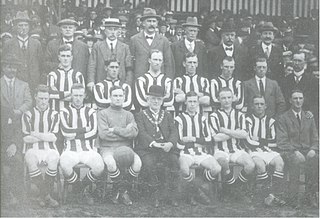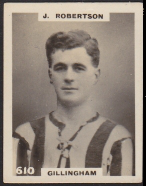Related Research Articles

Gillingham Football Club is a professional association football club based in the town of Gillingham, Kent, England. The only Kent-based club in the Football League, the "Gills" play their home matches at Priestfield Stadium. The team compete in League Two, the fourth tier of the English football league system, in the 2022–23 season.

Gillingham Football Club is an English football club based in Gillingham, Kent. The club was formed in 1893, and played in the Southern League until 1920, when that league's top division was absorbed into the Football League as its new Division Three. The club was voted out of the league in favour of Ipswich Town at the end of the 1937–38 season, but returned 12 years later, when that league was expanded from 88 to 92 clubs. Twice in the late 1980s Gillingham came close to winning promotion to the second tier of English football, but a decline then set in and in 1993 the club narrowly avoided relegation to the Football Conference. In 2000, the "Gills" reached the second tier of the English league for the first time in the club's history and went on to spend five seasons at this level, achieving a club record highest league finish of eleventh place in 2002–03. The club has twice won the division comprising the fourth level of English football: the Football League Fourth Division championship in 1963–64 and the Football League Two championship in 2012–13.
James Boswell was an English professional footballer. He played for Gillingham from 1946 until 1958, making 342 appearances in the English Football League, and appeared in more FA Cup matches than any other player in the club's history.

James Walter "Jock" Robertson was an English association footballer who played professionally for Gillingham. He joined the club while it was still playing non-league football and went on to set a club record for the most matches played in the Football League, making over 350 appearances.
Ernest Morgan was an English professional football player and manager. He spent the bulk of his career with Gillingham, where he set a record for the highest number of goals scored in a single season which still stands.
Karl William Elsey is a Welsh former professional footballer. His clubs included Swansea City, Queens Park Rangers, Newport County, Cardiff City, Gillingham, Reading and Maidstone United. In total he made over 450 Football League appearances.
David Watkin John Thomas was an English footballer who played as a centre forward. He played in the Football League for Plymouth Argyle, Watford and Gillingham, scoring 112 goals in 259 appearances. He also played non-league football for Romford and Sittingbourne. His brother, Bob, played in the Football League for several clubs as an inside forward.

Joseph Dickenson was an English footballer. He made his Football League debut in 1892 for Bolton Wanderers and went on to make 42 league appearances for the club, scoring 11 goals. He also appeared for the club in the 1894 FA Cup Final. In 1894 he moved to New Brompton and made 11 appearances in the club's first season in the Southern Football League. After spells playing for Chatham and Grays United he returned to New Brompton in 1903 and made a further two appearances.
Donald Rossiter was an English professional association football player turned politician. During his footballing career he made two appearances in The Football League and gained a winner's medal in the FA Amateur Cup. He later became active in local politics and served as Mayor of Rochester, Kent.
James Harold Poxton was an English professional footballer of the 1920s and 1930s. Born in Staveley, he joined Gillingham from West Bromwich Albion in 1928 and went on to make 43 appearances for the club in The Football League. He left to join Millwall in 1929. He subsequently played for Watford – predominantly at outside left – and Walsall.
Sydney Percy Gore was an English professional football player of the interwar years. Born in Faversham, he joined Gillingham from Faversham Rangers in 1918 and made eight appearances for the club in the Football League before leaving to join Sittingbourne. He joined Millwall in 1923 and made over 100 appearances over three seasons. After a spell with Chatham Town he rejoined Gillingham in 1929 and made a further 32 appearances. His last known club was Ashford Town.
John Ward was an English professional footballer of the 1920s. Born in Birtley, he joined Gillingham from Darlington in 1925 and went on to make two appearances for the club in The Football League. He left to join Fatfield Albion in 1926.
Leslie Balcombe was an English footballer of the 1930s. Born in Lambeth, he joined Gillingham from Tunbridge Wells Rangers in 1934 and went on to make 14 appearances for the club in The Football League, scoring one goal. He left to join Ashford Town (Kent) in 1937.
James Alfred Fletcher was an English former footballer of the 1950s and 1960s, who played professionally for Gillingham and as a semi-professional for various clubs in Kent. After retiring from football he became a successful breeder of racing greyhounds.
During the 1995–96 English football season, Gillingham F.C. competed in the Football League Third Division, the fourth tier of the English football league system. It was the 64th season in which Gillingham competed in the Football League, and the 46th since the club was voted back into the league in 1950. After being in severe financial difficulties for several months, Gillingham had been saved from going out of business during the summer of 1995 by new chairman Paul Scally, who purchased the club for a nominal fee and appointed Tony Pulis as the team's new manager. Having signed many new players, Gillingham began the season strongly with four consecutive wins and remained in the top three positions in the Third Division for the entire season, finishing in second place. The club thus gained promotion to the Second Division seven years after being relegated from the third tier.
Daniel Trevor Kedwell is an English footballer who plays as a forward for Chatham Town where he is also assistant manager. He has spent most of his career playing non-League football, but played in League One and Two during a four-year spell with Gillingham, his hometown club.
James S. Robertson was a footballer active prior to the First World War.
During the 1989–90 English football season, Gillingham F.C. competed in the Football League Fourth Division, the fourth tier of the English football league system. It was the 58th season in which Gillingham competed in the Football League and the 40th since the club was voted back into the league in 1950. In the previous season, the team had been relegated from the Third Division, after which a number of players left the club, resulting in several teenagers playing in the opening games of the new season. Gillingham began their league campaign in poor form but a run of five consecutive wins in October and November took them into the top six. In December, the team lost to Maidstone United in the first Football League match between two Kent-based teams. Gillingham remained in contention for promotion until early March, but then lost six consecutive games; the team finished the season 14th in the Fourth Division.
During the 1988–89 English football season, Gillingham F.C. competed in the Football League Third Division, the third tier of the English football league system. It was the 57th season in which Gillingham competed in the Football League, and the 39th since the club was voted back into the league in 1950. Gillingham began the season well, with two wins in the first three Third Division games, but then lost ten consecutive league games to slip close to the bottom of the league table. In late October, after the eighth of these defeats, Paul Taylor was dismissed as the club's manager and replaced by Keith Burkinshaw. The new manager could not significantly improve the team's performances, resigning in April with Gillingham bottom of the table. Former Gillingham player Damien Richardson ended the season as the club's manager. Gillingham finished the season 23rd out of 24 teams in the division and were relegated to the Fourth Division.
During the 1950–51 English football season, Gillingham F.C. competed in the Football League Third Division South, the third tier of the English football league system. It was the first season of Gillingham's second spell in the Football League; prior to this season the club was elected back into the competition having lost its place in 1938. Gillingham's results in the first half of the season were poor, including a 9–2 defeat to Nottingham Forest, the highest number of goals the team had conceded for more than 20 years; at the end of 1950 they were second bottom of the Third Division South league table. In January and early February Gillingham climbed to 19th in the 24-team division after winning five times in six games, including a 9–4 victory over Exeter City, a new record for the club's highest Football League score which would stand for more than 30 years. After this they won only once in ten matches; the team finished the season 22nd in the division.
References
- ↑ Joyce, Michael (2012) [2002]. Football League Players' Records 1888 to 1939. Nottingham: SoccerData. p. 159. ISBN 978-1-905891-61-0.
- ↑ Triggs, Roger (2001). The Men Who Made Gillingham Football Club. Tempus Publishing Ltd. p. 20. ISBN 0-7524-2243-X.
- ↑ Brown, Tony (2003). The Definitive Gillingham F.C.: A Complete Record. Soccerdata. p. 122. ISBN 1-899468-20-X.
